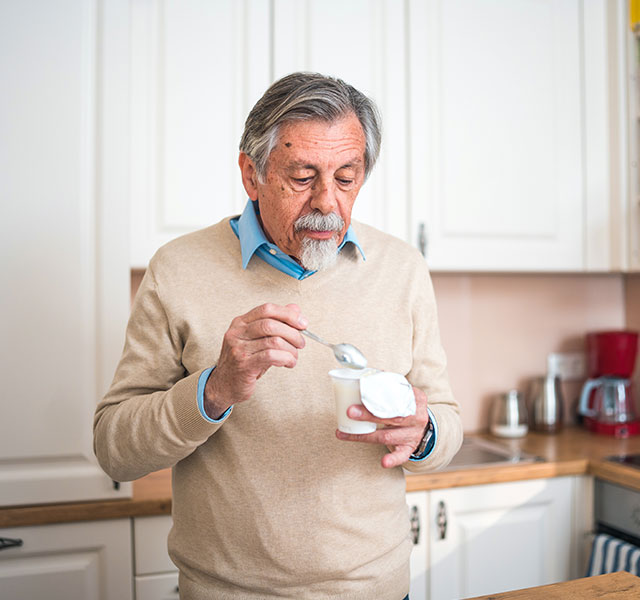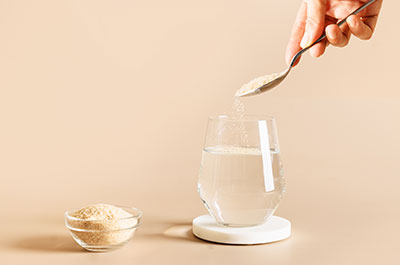Your digestive system (gut) microbiome is a diverse environment that is made up of hundreds of different bacteria and other microorganisms. Besides helping your body with digestion and avoiding infections, these friendly bugs also work constantly to maintain a healthy balance of good and bad bacteria – which can make the difference between being sick and being healthy.
As doctors uncover the secrets of the world of these tiny organisms, they have found fascinating connections to brain diseases like Parkinson’s disease (PD) and how they may be tied to gastrointestinal issues.
“Approximately 89% of people living with PD that struggle with motor symptoms will first experience disruptive GI issues,” says Isaac Goldszer, M.D., a neurologist at Henry Ford Health who specializes in PD. “We are looking at the gut microbiome to learn more about why this is and how changes to gut microbiome diversity may cause or worsen symptoms of PD.”
Here, Dr. Goldszer breaks down some of the recent findings about PD and gut health as well as how to maintain the good bacteria in your body throughout life.
How Your Brain And Your Gut Communicate
One strong piece of evidence for the connection between the brain and gut is the vagus nerve. This nerve, or collection of organic wiring, starts in the brain and travels to the heart, lungs and digestive organs. This connection allows for signaling between all of these organs.
Most importantly, this highway of information goes in both directions; it tells the brain about the state of your organs and can direct organs when to relax or work harder.
“The brain uses signals from the gut to understand when things are good or when the body is in a state of distress,” says Dr. Goldszer.
How Gut Microbiome Diversity Impacts Your Risk For Parkinson’s Disease

Parkinson's Disease Treatment At Henry Ford
By the age of 3, your gut microbiome has already reached peak diversity. From there, everything we eat, drink and breathe contains bacteria that can influence that microbiome. However, as you get older, the diversity of your gut microbiome starts to decrease, which may be the key to helping doctors understand conditions like Parkinson’s disease.
“We know that aging is the number one risk factor for PD,” says Dr. Goldszer. “This is because the neurons that make dopamine in your brain start to die off. While for most this process naturally starts in your 70s, for people with age-related PD, it starts earlier.”
Most PD research has focused on alpha synuclein, a naturally occurring protein found in the brain and the gut, as a cause for symptoms like tremor and difficulties walking. Researchers think that when this protein misaligns, it can get “sticky” and interfere with normal cell function. Because it is also found in the gut, it may cause “non-motor” symptoms of PD.
“We think that this could be the cause of problems with automatic function in PD such as constipation and trouble swallowing,” says Dr. Goldszer.
Balancing Your Gut To Promote Brain Health
“The idea that PD starts in the gut is a newer concept that we are still digesting,” says Dr. Goldszer. “We know that having Parkinson’s slows your digestion and the medications we use to treat PD can alter your microbiome. It is hard to know which is the chicken and which is the egg because people with PD suffer higher rates of constipation, but constipation and altered gut microbial diversity could also be a risk factor for the development of PD.”
That is why caring for your gut health is important. Here are some recommendations from Dr. Goldszer on how to do that:
- Eat more living foods. Foods that are fermented or contain live cultures can help balance the good bacteria in your gut – keeping your digestion working as it should. Some examples of these foods include kefir or yogurt, kimchi, sauerkraut and kombucha.
- Exercise. Regular exercise helps to strengthen muscles throughout the body, including those that help with digestion. Plus, moving helps your body digest food more effectively.
- Limit alcohol and ultra-processed foods. Alcohol damages your gut diversity and research shows that eating ultra-processed foods can reduce your gut’s diversity. Focus more on eating whole foods like unprocessed meats, fruits and vegetables for optimal health.
- Rethink your PPI. Proton pump inhibitors (PPIs) are over-the-counter medications used treat conditions related to acid reflux symptoms. However, these medications don’t address the root cause of your symptoms, can reduce gut diversity and have even been linked to chronic health issues. Talk with your doctor about how to get off your PPI and consider altering your diet to avoid triggers or eating too late in the day.
- Hydrate. Adequate hydration is important for people who suffer from constipation.
- Talk to your doctor about probiotics. Probiotics can help with your gut health but vary in how helpful they are. Talk to your doctor to see if a probiotic would be helpful for you and what to look for in a supplement.
Most importantly, just because you have GI issues does not mean that you will eventually develop PD. However, if you struggle with regular constipation, irritable bowel syndrome (IBS) or other gastrointestinal issues, Dr. Goldszer recommends you work with your doctor to understand these conditions and get to the root cause of them.
Reviewed by Dr. Isaac Goldszer, a neurologist who sees patients at Henry Ford Hospital, Henry Ford West Bloomfield Hospital Clinics and Henry Ford Medical Center - Bloomfield Twp.



